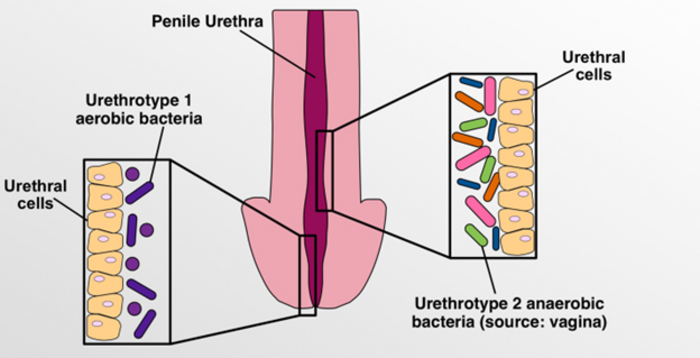Contrary to common beliefs, your urine is not germ free. In fact, a new study shows that the urethra of healthy men is teeming with microbial life and that a specific activity—vaginal sex—can shape its composition. The research, published March 24 in the journal Cell Reports Medicine, provides a healthy baseline for clinicians and scientists to contrast between healthy and diseased states of the urethra, an entrance to the urinary and reproductive systems.

Credit: Stephen Jordan
Contrary to common beliefs, your urine is not germ free. In fact, a new study shows that the urethra of healthy men is teeming with microbial life and that a specific activity—vaginal sex—can shape its composition. The research, published March 24 in the journal Cell Reports Medicine, provides a healthy baseline for clinicians and scientists to contrast between healthy and diseased states of the urethra, an entrance to the urinary and reproductive systems.
“We know where bugs in the gut come from; they primarily come from our surroundings through fecal-oral transfer,” says co-senior author David Nelson, a microbiologist at Indiana University. “But where does genital microbiology come from?”
To flush out the answer, the team of microbiologists, statisticians, and physicians sequenced the penile urethra swabs of 110 healthy adult men. These participants had no urethral symptoms or sexually transmitted infections (STIs) and no inflammation of the urethra. DNA sequencing results revealed that two types of bacterial communities call the penile urethra home—one native to the organ, the other from a foreign source.
“It is important to set this baseline,” says co-senior author Qunfeng Dong, a bioinformatician at Loyola University Chicago. “Only by understanding what health is can we define what diseases are.”
The researchers found that most of the healthy men had a simple, sparse community of oxygen-loving bacteria in the urethra. In addition, these bacteria probably live close to the urethral opening at the tip of the penis, where there is ample oxygen. The consistent findings of these bacteria suggest that they are the core community that supports penile urethra health.
But some of the men also had a more complex secondary group of bacteria that are often found in the vagina and can disturb the healthy bacterial ecosystem of the vagina. The team speculates that these bacteria reside deeper in the penile urethra because they thrive in oxygen-scarce settings. Only men who reported having vaginal sex carry these bacteria, hinting at the microbes’ origins.
Delving into the participant’s sexual history, the team found a close link between this second bacterial community and vaginal sex but not other sexual behaviors, such as oral sex and anal sex. They also found evidence that vaginal sex has lasting effects. Vagina-associated bacteria remained detectable in the participants for at least two months after vaginal sex, indicating that sexual exposure to the vagina can reshape the male urinary-tract microbiome.
“In our study, one behavior explains 10% of the overall bacterial variation,” says Nelson, when discussing the influence of vaginal sex. “The fact that a specific behavior is such a strong determinant is just profound.”
Although current findings from the study show that vaginal bacteria can spread to the penile urethra, the team’s next plan is to test whether the reverse is true. Using the newly established baseline, the researchers also hope to offer new insights into bacteria’s role in urinary- and reproductive-tract diseases, including unexplained urethral inflammation and STIs.
“STIs really impact people who are socioeconomically disadvantaged; they disproportionately impact women and minorities,” says Nelson. “It’s a part of health care that’s overlooked because of stigma. I think our study has a potential to dramatically change how we handle STI diagnosis and management in a positive way.”
###
This work was supported by the National Institute of Allergy and Infectious Diseases.
Cell Reports Medicine, Toh et al.: “Sexual behavior shapes male genitourinary microbiome composition” https://www.cell.com/cell-reports-medicine/fulltext/S2666-3791(23)00087-3
Cell Reports Medicine (@CellRepMed) is a broad scope open-access journal from Cell Press publishing cutting-edge research in translational and clinical biomedical sciences that inform and influence human health and medicine. Visit https://www.cell.com/cell-reports-medicine/home. To receive Cell Press media alerts, contact [email protected].
Journal
Cell Reports Medicine
DOI
10.1016/j.xcrm.2023.100981
Method of Research
Experimental study
Subject of Research
People
Article Title
Sexual behavior shapes male genitourinary microbiome composition
Article Publication Date
21-Mar-2023




